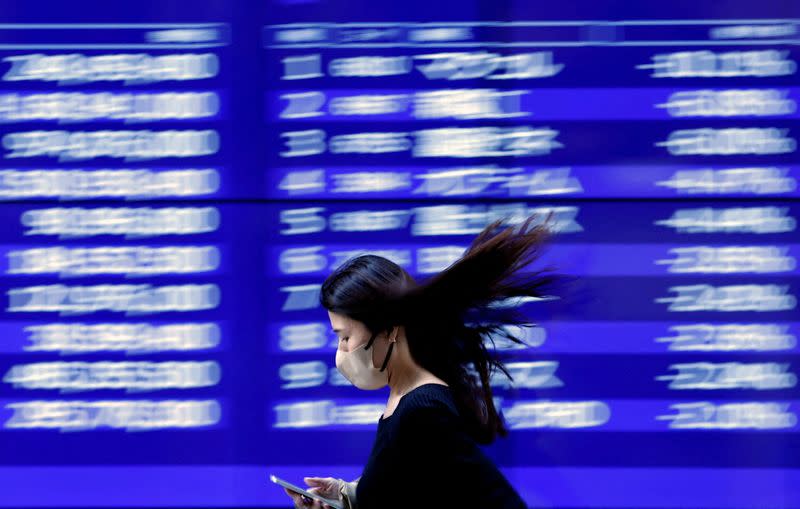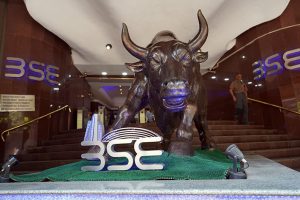Asia’s major stock indexes struggled to find any momentum on the opening day of the week with many investors keeping their powder dry ahead of a slew of big data releases.
Central bank decisions in Europe, Japan and the United States, along with US inflation figures that will likely influence the Federal Reserve’s monetary policy, will all be released over the next few days and that meant many traders stayed on the sidelines on Monday.
Japan’s Nikkei share average, though, rose for a second straight day, buoyed by a rally in shares of domestic drugmakers and chip-related companies, and a strong end to the week for Wall Street on Friday.
Also on AF: Fossil Fuel Companies ‘Doing Little to Meet Net Zero Goals’
The Nikkei finished the day up 0.52% to 32,434.00, about 275 points back from last Wednesday’s 33-year peak of 32,708.53. The broader Topix rose 0.65% to 2,238.77, nudging towards its 33-year top from Wednesday’s 2,250.20.
Looming policy decisions from the US Fed on Wednesday and the Bank of Japan on Friday prevented traders from chasing shares higher and investors are also still trying to gauge if the Nikkei’s rally has gotten too hot following a near-23% surge since mid-March to last week’s high.
Healthcare was the best-performing Nikkei sector on Monday, rising 1.59% after Eisai’s Alzheimer’s drug Leqembi got the unanimous backing of a panel of US Food and Drug Administration (FDA) experts.
China shares fell and Hong Kong was flat as investors braced for fresh data this week which will likely add to concerns of the economic health of the world’s second-biggest economy.
Risk appetite has been curbed by signs that China’s post-Covid economic recovery is losing steam. Following weaker-than-expected inflation data in May, credit lending, retail sales and industrial output data being released in China this week could also undershoot forecasts.
The Shanghai Composite Index dipped 0.08%, or 2.57 points, to 3,228.83, while the Shenzhen Composite Index on China’s second exchange advanced 0.73%, or 14.73 points, to 2,021.18.
The Hang Seng Index gained 0.07%, or 14.36 points, to 19,404.31. China’s tech-focused STAR Market and Hong Kong’s Hang Seng Tech Index both fell.
Indian stocks advanced with Mumbai’s signature Nifty 50 index up 0.19%, or 35.95 points, at 18,599.35.
MSCI’s broadest index of Asia-Pacific shares outside Japan was 0.07% higher at 521.24, having touched a more than one-month peak of 521.94 earlier in the session. The index is up 4% for the month.
Bank of Japan Loose Policy
Futures indicated European stocks were set to open higher, with the Eurostoxx 50 futures up 0.35%, German DAX futures up 0.34% and FTSE futures gaining 0.40%. E-mini futures for the S&P 500 rose 0.13%.
Last week, the Reserve Bank of Australia and Bank of Canada stunned markets by increasing interest rates to tame stubborn and sticky inflation, stoking worries that the Fed might follow suit and take a hawkish stance in its June meeting.
Citi strategists said the Fed could be faced with the lesson that other central banks like the Bank of Canada have learned – further tightening is still needed to bring inflation to 2%.
Markets are pricing for a 71% probability the US central bank will stand pat when it meets on June 13-14, according to the CME FedWatch tool.
In the currency market, the dollar index, which measures the US currency versus six major rivals, rose 0.087%, with the euro down 0.07% to $1.074.
The yen weakened 0.06% to 139.44 per dollar ahead of the Bank of Japan’s (BOJ) policy meeting on Friday.
The BOJ is expected to maintain ultra-loose monetary policy this week and its forecast for a moderate economic recovery.
US crude fell 1.33% to $69.24 per barrel and Brent was at $73.82, down 1.3% on the day. Both benchmarks notched their second straight weekly decline last week as disappointing China economic data raised concerns about demand growth in the world’s largest crude importer.
Key figures
Tokyo – Nikkei 225 > UP 0.52% at 32,434.00 (close)
Hong Kong – Hang Seng Index > UP 0.07% at 19,404.31 (close)
Shanghai – Composite < DOWN 0.08% at 3,228.83 (close)
London – FTSE 100 > UP 0.35% at 7,588.53 (close)
New York – Dow > UP 0.13% at 33,876.78 (Friday close)
- Reuters with additional editing by Sean O’Meara
Read more:
Saudi Arabia Emerging as Hot New Market For Chinese Investors
OpenAI Chief Urges South Korea to Supply Chips for AI Boom






















